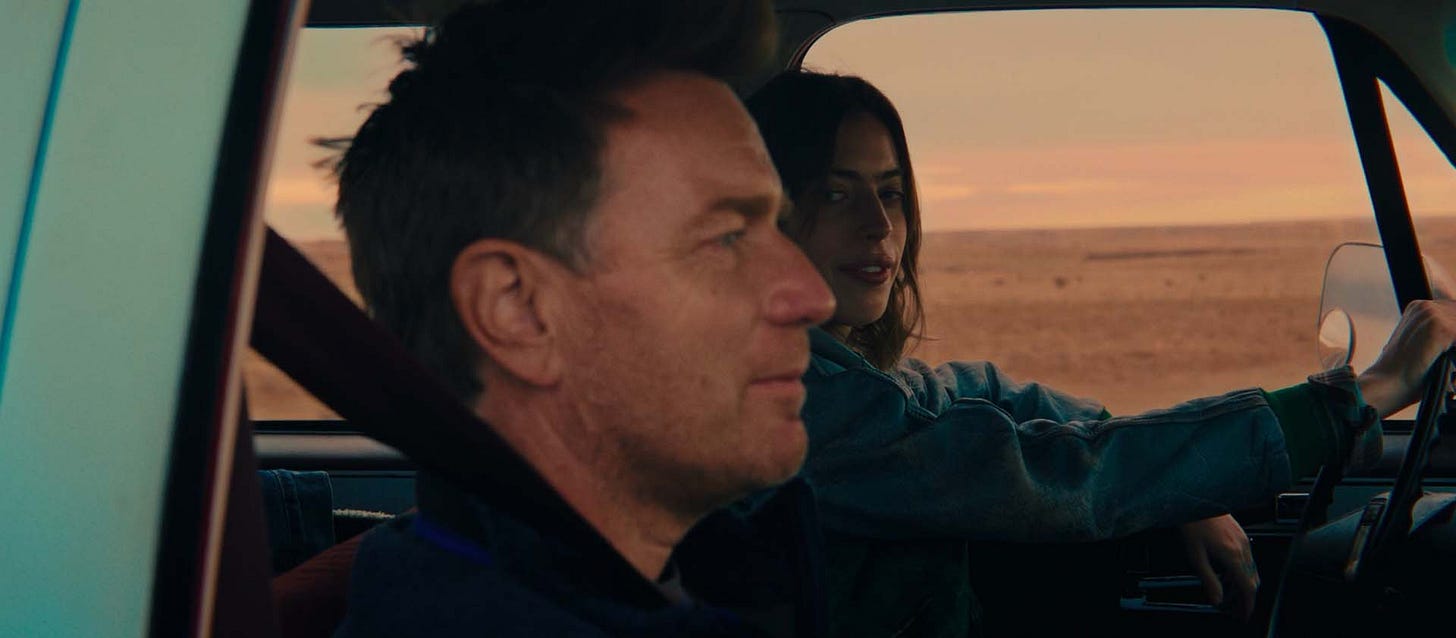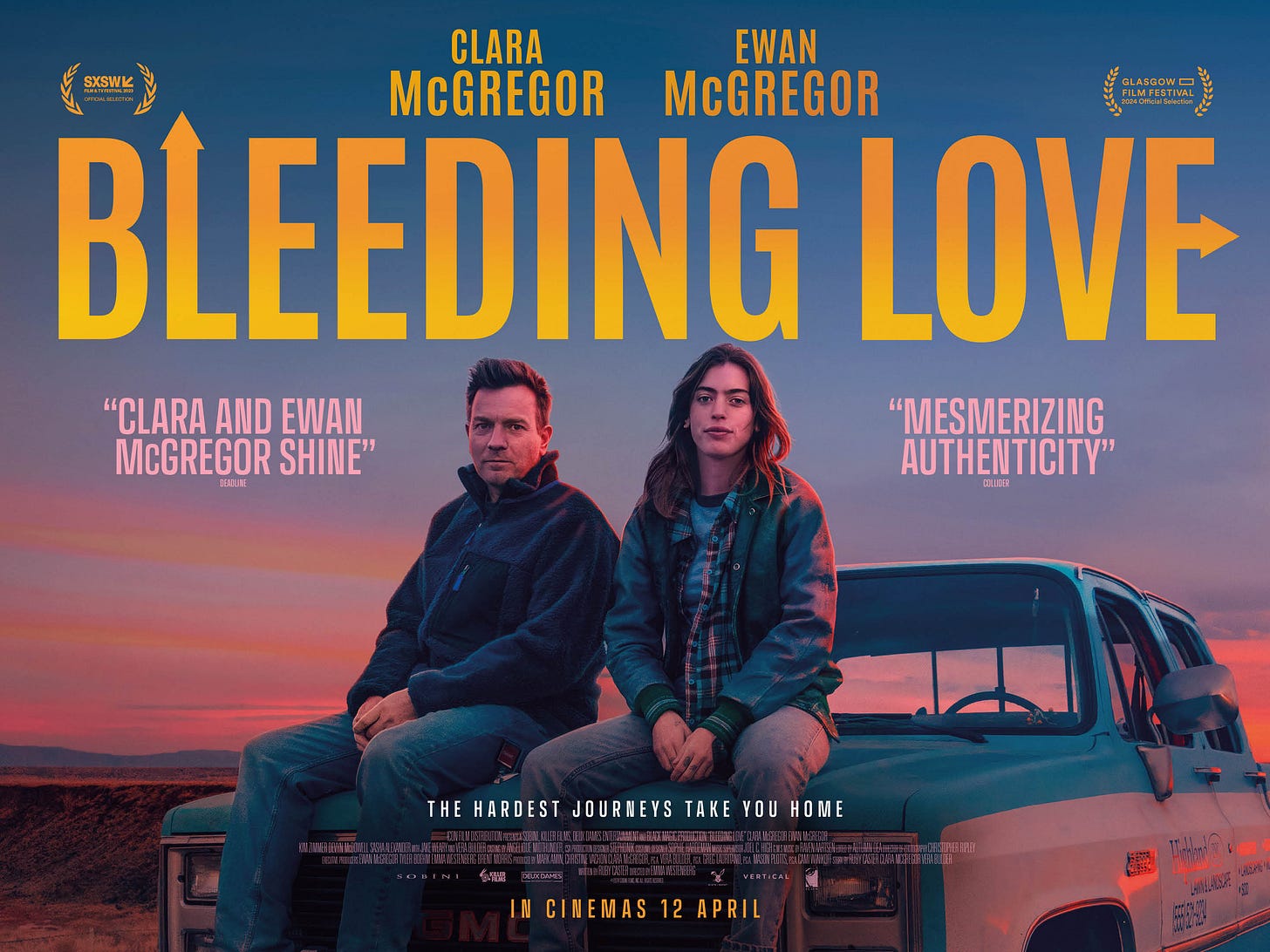Review: Bleeding Love (2024)
A gripping and affecting road trip film
Ewan McGregor and Clara McGregor star in Bleeding Love | Dir. Emma Westenberg
In Bleeding Love, Emma Westenberg serves up an original drama featuring real life father-daughter duo Clara and Ewan McGregor. As the pair travel across New Mexico, the roots of their relationship are exposed, strained and tested, providing a gripping and affecting road trip film.
We’re dropped in the thick of a complex and tense situation, as a formerly estranged parent and adult child find themselves driving towards Santa Fe. And though they are two people travelling in the same direction, it often feels like more a chase as the father tries to catch his daughter before she slips away. The circumstances are upsetting, with the daughter having recently survived a near-fatal overdose, and the father re-entering her life to try to restore their broken bond, or at the very least, assist in her recovery. It marks a significant turning point in her life, and in their relationship.
In the truck it’s awkward: conversation is stunted, resentment and smoke fill the cab as if to make up for the dead air between them. After years of disconnection, the difficult void separating the pair has understandably grown, and we sense this with every word, glance and exhale. The daughter, feeling rejected and unworthy of her father’s love due to his absence, is almost unable to compute that he may actually care about her. Unfortunately, she has developed her own coping mechanisms to deal with the emotional trauma of an absent parent. Fortunately, the father is all too familiar with these methods and recognises that he needs to intervene now or lose her to addiction for good.
His resultant decision to withhold the real destination of their trip to her is morally ambiguous at best, and as an audience we are only presented with the present actions of the characters and a series of hazy flashbacks to know whether or not his call to fabricate a reason for the trip in order to get her to rehab was the right one. It’s an interesting conundrum, and perhaps points to an innate impulsiveness on the the father’s part that he’s never been able to shake, but despite his naivety, his care and desire to protect his daughter never comes into question. How he gets her to the destination may be problematic, but his reasons for doing so are pure.
Existing in close quarters with someone for a prolonged period of time is a surefire way to get to know them quickly, and Westenberg uses the space to explore how the relationship progresses (or regresses) over the day or so they spend travelling as they come face to face with a multitude of issues - some more deep-seated than others. A lot of the conflict occurs because one of the characters is at a fork in their life’s journey, and they will soon need to choose between recovery or self-destruction, while the other is already on another path as a recovering addict (along with additional dependents).
As the father watches his daughter struggle with substance use and observes many patterns of behaviour that may recall triggering, painful memories for him, we realise how difficult it must be for him to witness history repeat itself in his child. To an extent, she tries to hide it from him by sneaking bottles of alcohol into her bag, and she’s worryingly efficient in the way that she procures other substances, but he knows this road because he has walked it, so any attempts to conceal this part of her are futile.
Among the despair, there are moments of hope. One being a scene where they both jump in the motel pool - the spontaneity of it creates a sense of lightness and fun and almost feels like they are in a carefree holiday mode. The other moment is in the truck when they sing along to Leona Lewis’s eponymous song ‘Bleeding Love’. There is just something wholesome and bonding about two people singing really loudly to a ballad while driving along a motorway and when it happens here, the tension lifts and they are both existing and living in the same moment. No thinking about the past (“he left us”), no thinking about the future (“when can I get out of this thing”), just projecting the same words at the same time, at roughly the same pitch. A present moment.
The writing team on this film (Ruby Caster, Clara McGregor, Vera Bulder) use pit stops as a way of introducing new, temporary characters to add another layer to the narrative. The people we meet are outlandish and entertaining (Kim Zimmer was particularly fabulous), perhaps as a way to counter the melancholy surrounding the lead characters, though they are certainly no less dysfunctional. The most striking triumph of the film is the chemistry between the father and daughter, and a lot of this is down to the screenplay, but largely owed to Clara’s performance. Her character is incredibly fragile and psychologically complex, oscillating between reasoned and irrational thinking, but McGregor subtly conveys cues about her feelings towards her father through body language alone. It’s a very nuanced physical performance and she is captivating to watch.
As road films go, this one treads an emotionally charged line between heartbreak and healing extremely well. Were it not for the convincing leads, it could have veered into tasteless territory, but thanks to the McGregors - Clara’s erratic manner and Ewan’s quiet determination to make things better - it is a consuming and compelling watch which will make you feel the gravity of a personal situation and if nothing else, act as a reminder of the fragility of human beings. Clocking in at just over the 1 hour 30 minute mark, it covers some heavy subject matter, makes a significant emotional impact and takes some creative risks that pay off - it’s a superb indie worth 96 minutes of your time.
Verdict: Bleeding Love is a film with a big heart. A year on from its premier at SXSW, Ewan McGregor lets his daughter Clara take the lead in this road trip-come-family drama, as she plays a vulnerable person struggling with addiction.
Overall? ⭐⭐️⭐⭐
Big screen appeal? 🎬🎬🎬
Accolade eligibility? 💡💡💡
Study-worthy? 📚📚📚




